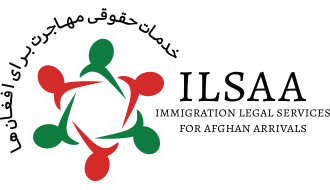Afghan Arrivals
Interested in receiving
immigration legal services?
Call us toll free at 833-286-0864.
Request Free Immigration Legal Services
Many Afghan individuals and families are facing legal challenges that could significantly impact their ability to live permanently and securely in the United States.
Navigating these legal issues without adequate support can be complex and confusing. We can help.
Immigration Legal Services for Afghan Arrivals (ILSAA) attorneys and their teams provide free immigration legal services for Eligible Afghan Arrivals (EAAs), including support for pathways to permanent residency, such as obtaining asylum status and Special Immigrant Visa (SIV) status, family reunification and more. Services are available in all of the languages spoken in Afghanistan, including Dari and Pashto.

Who is an EAA? You are considered an EAA if you are an Afghan humanitarian parolee, an unaccompanied Afghan minor, or other Afghan with eligible status as defined in ORR Policy Letter 22-01. At this time, ILSAA cannot provide legal assistance to Afghans who are outside of the United States.
How to request legal services:
- Call us toll-free at 833-286-0864 or email ILSAAinfo@icf.com with your name, phone number, and primary language preference to identify translation needs
- An ILSAA team member will respond and help determine your eligibility
- If you are eligible, ILSAA will match you with a qualified Legal Service Provider (LSP) who meets your needs

Access Resources for Afghan Arrivals
This curated resource list includes information on current legal immigration issues and challenges for Afghan newcomers from ILSAA and other federal and non-federal organizations.
Are You Caring for An Afghan Child but Are Not Their Legal Parent? (دری) (پښتو)
Learn the different ways to legally obtain the right to act on behalf of children to obtain services for them.
Can I Travel Outside the U.S.? (دری) (پښتو)
Find information that can help you determine whether to travel outside the U.S. based on your current immigration status and the status of your applications.
Department of Homeland Security Announces Re-parole Process for Afghan Arrivals (دری) (پښتو)
A one-page detailed resource on the re-parole process, including updated deadlines, instructional videos, and additional resources.
Listen to a shareable audio message about this resource. (دری) (پښتو)
Frequently Asked Questions on Temporary Protected Status for Afghans (دری) (پښتو)
Learn more about eligibility, benefits, and limitations. Know when and where to apply.
How to Check Case Processing Times (دری) (پښتو)
Read this document to learn how to use the USCIS self-service options and online tool to check case processing times.
Scam Alert: How to Spot a Fake Lawyer (دری) (پښتو)
Learn the different approaches fraudster advisors, without legal immigration training, may take to try to scam you.
Stay Informed: How to Check Your USCIS Case Status (دری) (پښتو)
You can use the U.S. Citizenship and Immigration Services (USCIS) case status tool online to receive an update on pending immigration applications or petitions. Receive detailed instructions on how to use the tool.
Terrorism-Related Inadmissibility Grounds (دری) (پښتو)
This Terrorism-Related Inadmissibility Grounds (TRIG) fact sheet provides an overview of TRIG, including who it affects, and what exemptions there are.
URGENT: What Afghan Minors and Their Caregivers Need to Know (دری) (پښتو)
Are you an Afghan Minor who was paroled into the United States? You may need to apply for re-parole.
URGENT: Update Your Address with USCIS (دری) (پښتو)
Keeping your address current with the U.S. government is critical to maintaining legal residency in the U.S. Get detailed instructions on how to update your address with USCIS.
What to Expect: Filing a Case for Legal Status with ILSAA (دری) (پښتو)
Find out how to engage with the ILSAA team to obtain legal residency in the U.S., from submitting your request, to partnering with a lawyer, and receiving a final decision.
U.S. Citizenship and Immigration Services (USCIS):
Afghan Operation Allies Welcome (OAW) Parolee Asylum-Related Frequently Asked Questions (دری) (پښتو)
Find answers to frequently asked questions about asylum.
USCIS: Information for Afghan Nationals (دری) (پښتو)
Read an overview of legal permanent solutions for Afghan nationals.
American Bar Association: Afghan Asylum 101 Videos
Gain a better understanding of the asylum process for Afghans. The videos, produced in November 2021, follow the I-589 Form Application for Asylum under "Operation Allies Welcome."
USAHello: Afghan Status and Benefit Options (دری) (پښتو)
Read about different immigration statuses and the benefits of each.
USAHello: Family Reunification (دری) (پښتو)
Discover the basics of how family reunification works, its benefits, and see an overview of the process.
USAHello: Immigration Information for Afghan Nationals (دری) (پښتو)
Explore the immigration, benefits, and social services available for Afghan nationals.
USAHello: Temporary Protected Status (دری) (پښتو)
Find out who can apply and how to apply for temporary protected status (TPS). Find help and get information on work and travel permits, and other protections under TPS.
VECINA: Afghan Asylum Seekers Interview Preparation (online course) (دری) (پښتو)
Learn about the purpose of the asylum interview, who is an asylum officer, what is an asylum office, who should come to the interview, interpretation services, and questions that will be asked.
Find practical information and resources for newly arriving Afghans to the United States, including information about services and benefits, immigration, jobs, daily life, American culture, U.S. laws, money, health, and education.

